2018年人教版七年级下册英语1-6单元知识点归纳
人教版七年级下册英语1-6单元复习重点
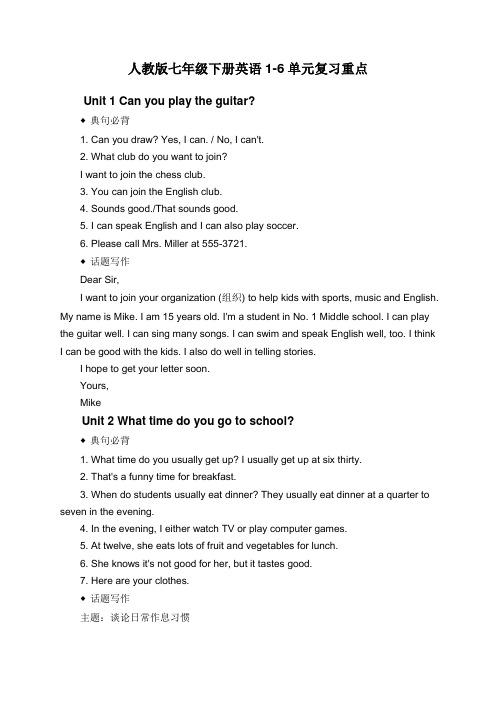
人教版七年级下册英语1-6单元复习重点Unit 1 Can you play the guitar?◆典句必背1. Can you draw? Yes, I can. / No, I can't.2. What club do you want to join?I want to join the chess club.3. You can join the English club.4. Sounds good./That sounds good.5. I can speak English and I can also play soccer.6. Please call Mrs. Miller at 555-3721.◆话题写作Dear Sir,I want to join your organization (组织) to help kids with sports, music and English. My name is Mike. I am 15 years old. I'm a student in No. 1 Middle school. I can play the guitar well. I can sing many songs. I can swim and speak English well, too. I think I can be good with the kids. I also do well in telling stories.I hope to get your letter soon.Yours,MikeUnit 2 What time do you go to school?◆典句必背1. What time do you usually get up? I usually get up at six thirty.2. That's a funny time for breakfast.3. When do students usually eat dinner? They usually eat dinner at a quarter to seven in the evening.4. In the evening, I either watch TV or play computer games.5. At twelve, she eats lots of fruit and vegetables for lunch.6. She knows it's not good for her, but it tastes good.7. Here are your clothes.◆话题写作主题:谈论日常作息习惯My School DayI am a student. I usually get up at seven, and I eat breakfast at seven thirty.Then I go to school at eight. School starts at eight thirty. I eat lunch at twelve. I go home at 17:00. I often eat dinner at 19:00 and then play the piano. I do my homework at 20:00. At 22:00, I go to bed.Unit 3 How do you get to school?◆典句必背1. How do you get to school? I ride my bike.2. How far is it from your home to school?3. How long does it take you to get to school?4. For many students, it is easy to get to school.5. There is a very big river between their school and the village.◆话题写作主题:上学的交通方式写作思路:开篇点题:点出自己的出行方式;具体内容:自己选择这种交通方式的原因;结束语: 表明自己的观点。
人教版七年级下册英语重点知识点第一单元到第六单元
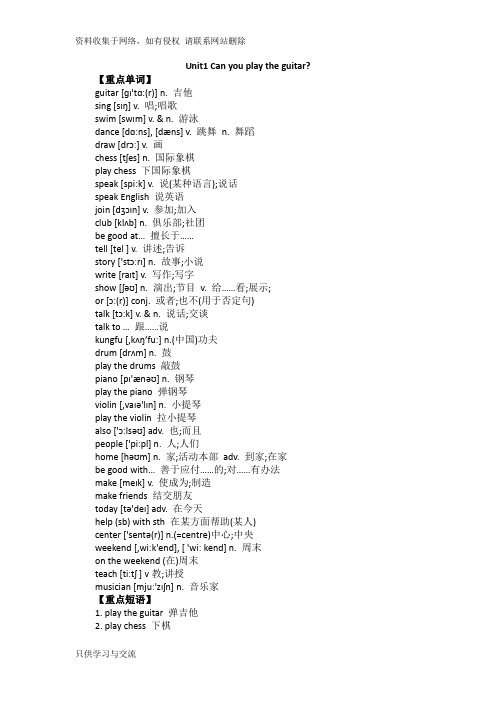
Unit1 Can you play the guitar?【重点单词】guitar [ɡɪ'tɑ:(r)] n. 吉他sing [sɪŋ] v. 唱;唱歌swim [swɪm] v. & n. 游泳dance [dɑːns], [dæns] v. 跳舞n. 舞蹈draw [drɔː] v. 画chess [tʃes] n. 国际象棋play chess 下国际象棋speak [spiːk] v. 说(某种语言);说话speak English 说英语join [dʒɔɪn] v. 参加;加入club [klʌb] n. 俱乐部;社团be good at… 擅长于……tell [tel ] v. 讲述;告诉story ['stɔːrɪ] n. 故事;小说write [raɪt] v. 写作;写字show [ʃəʊ] n. 演出;节目v. 给……看;展示;or [ɔː(r)] conj. 或者;也不(用于否定句)talk [tɔːk] v. & n. 说话;交谈talk to … 跟……说kungfu [,kʌŋ’fuː] n.(中国)功夫drum [drʌm] n. 鼓play the drums 敲鼓piano [pɪ'ænəʊ] n. 钢琴play the piano 弹钢琴violin [,vaɪə'lɪn] n. 小提琴play the violin 拉小提琴also ['ɔːlsəʊ] adv. 也;而且people ['piːpl] n. 人;人们home [həʊm] n. 家;活动本部adv. 到家;在家b e good with… 善于应付……的;对……有办法make [meɪk] v. 使成为;制造make friends 结交朋友today [tə'deɪ] adv. 在今天help (sb) with sth 在某方面帮助(某人)center ['sentə(r)] n.(=centre)中心;中央weekend [,wiːk'end], [ 'wiː kend] n. 周末on the weekend (在)周末teach [tiːtʃ ] v教;讲授musician [mjuː'zɪʃn] n. 音乐家【重点短语】1. play the guitar 弹吉他2. play chess 下棋3. speak English 说英语3. what to do sth 想做某事4. join the music club 加入音乐俱乐部5. match…..with 与……匹配6. the swimming club 游泳俱乐部7. what club 什么俱乐部8. a sports club 一个体育俱乐部10. be good at telling stories 擅长讲故事11. the story telling club 讲故事俱乐部12. like to do/doing sth 喜欢做某事13. let’s join 让我们加入......14. sound good 听起来不错15. students wanted for School Show 学校表演招聘学生16. talk to/with sb 跟某人谈话17. after school 放学后18. do kung fu 表演功夫;练功夫19. show sb. sth.=show sth. to sb. 把某物展示给某人20. play games with people 和人们做游戏21.be in the school music club 在学校音乐俱乐部22. help for old people 对老人的帮助23. be good with… 和某人相处得好,善于和..打交道24. be free / be busy 空闲的/忙的25. in July 在六月份26. tell sb. stories 给某人讲故事27. make friends with… 和某人交朋友28. call sb. at …… 给某人打电话……29. on the weekend 在周末30. help sb.(to) do sth. 帮助某人做某事31. help sb. with sth. 在某方面帮助某人32. English-speaking students 说英语的学生33. It is+adj +(for sb) to sth. 做某事(对于某人来说)是…..34. play the piano 弹钢琴35. play the violin 拉小提琴36. the Students’ Sports Center 学生运动中心37. need help to teach music 需要帮助来做某事38. need sb. to do sth 需要某人做某事39. teach sb. to do sth 教某人做某事40. be in our school music festival 参加我们学校的音乐节【重点句型】1. —Can you swim?你会游泳吗?—No,I can’t.不,我不会。
人教版七年级下册英语1-6单元复习重点(集锦5篇)
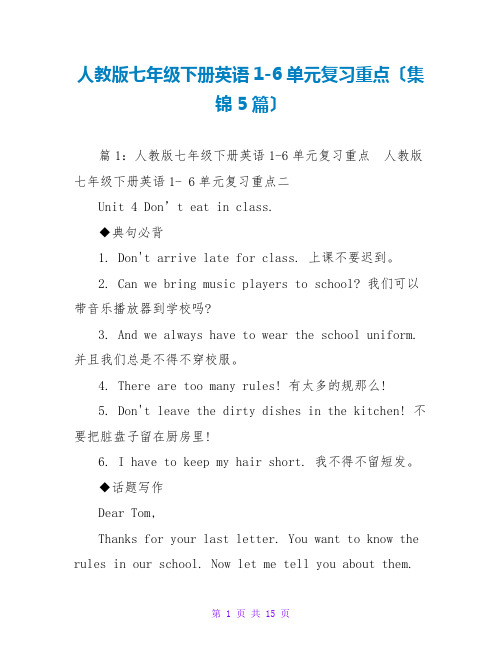
人教版七年级下册英语1-6单元复习重点〔集锦5篇〕篇1:人教版七年级下册英语1-6单元复习重点人教版七年级下册英语1- 6单元复习重点二Unit 4 Don’t eat in class.◆典句必背1. Don't arrive late for class. 上课不要迟到。
2. Can we bring music players to school? 我们可以带音乐播放器到学校吗?3. And we always have to wear the school uniform. 并且我们总是不得不穿校服。
4. There are too many rules! 有太多的规那么!5. Don't leave the dirty dishes in the kitchen! 不要把脏盘子留在厨房里!6. I have to keep my hair short. 我不得不留短发。
◆话题写作Dear Tom,Thanks for your last letter. You want to know the rules in our school. Now let me tell you about them.We can't arrive late for class. We can't talkloudly in class. We should keep quiet. When we meetour teachers on our way, we should say hello to them. We can't eat or drink in class, and we can't listen to music or play games in class.I think we have too many rules. What about yours? Please write and tell me.Yours,Li MingUnit 5 Why do you like pandas?◆典句必背1. —Why do you like pandas? 你为什么喜欢熊猫?—Because they're kind of interesting. 因为它们有点儿有趣。
2018年人教版初一英语下册1-6单元知识点归纳
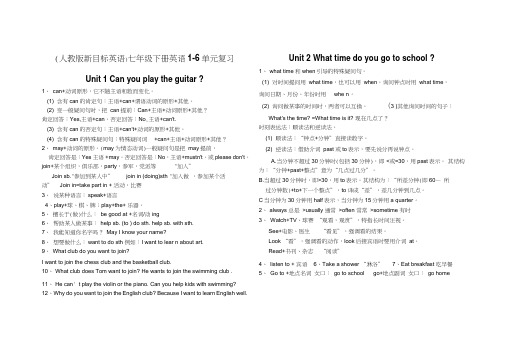
(人教版新目标英语)七年级下册英语1-6单元复习Unit 1 Can you play the guitar ?1、can+动词原形,它不随主语和数而变化。
(1) 含有can的肯定句:主语+can+谓语动词的原形+其他。
(2) 变一般疑问句时,把can提前:Can+主语+动词原形+其他?肯定回答:Yes,主语+can。
否定回答:No,主语+can't.(3) 含有can的否定句:主语+can't+动词的原形+其他。
(4) 含有can的特殊疑问句:特殊疑问词+can+主语+动词原形+其他?2、may+动词的原形。
(may为情态动词)一般疑问句是把may提前,肯定回答是:Yes主语+may。
否定回答是:No,主语+mustn't。
或please don't。
join+某个组织,俱乐部,party,参军,党派等"加入”Join sb."参加到某人中”join in (doing)sth "加入做,参加某个活动”Join in=take part in + 活动,比赛3、说某种语言:speak+语言4、play+球、棋、牌;play+the+ 乐器。
5、擅长于(做)什么:be good at +名词/动ing6、帮助某人做某事:help sb. (to ) do sth. help sb. with sth.7、我能知道你名字吗?May I know your name?8、想要做什么:want to do sth 例如:I want to lear n about art.9、What club do you want to join?I want to join the chess club and the basketball club.10、What club does Tom want to join? He wants to join the swimming club .11、He can' t play the violin or the piano. Can you help kids with swimming?12、Why do you want to join the English club? Because I want to learn English well.Unit 2 What time do you go to school ?1、what time和when引导的特殊疑问句。
2018年 七年级英语下册(人教版)全册笔记 超详细
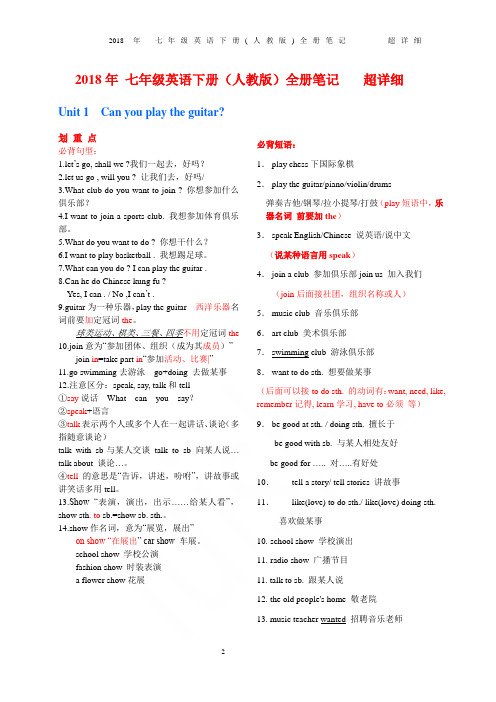
2018年七年级英语下册(人教版)全册笔记超详细2018年七年级英语下册(人教版)全册笔记超详细Unit 1 Can you play the guitar?划重点必背句型:1.let’s go, shall we ?我们一起去,好吗?2.let us go , will you ? 让我们去,好吗/3.What club do you want to join ? 你想参加什么俱乐部?4.I want to join a sports club. 我想参加体育俱乐部。
5.What do you want to do ? 你想干什么?6.I want to play basketball . 我想踢足球。
7.What can you do ? I can play the guitar .8.Can he do Chinese kung fu ?Yes, I can . / No ,I can’t .9.guitar为一种乐器,play the guitar 西洋乐器名词前要加定冠词the。
球类运动、棋类、三餐、四季不用定冠词the 10.join意为“参加团体、组织(成为其成员)”join in=take part in“参加活动、比赛|”11.go swimming去游泳go+doing 去做某事12.注意区分:speak, say, talk和tell①say说话What can you say?②speak+语言③talk表示两个人或多个人在一起讲话、谈论(多指随意谈论)talk with sb与某人交谈talk to sb 向某人说… talk about 谈论…。
④tell的意思是“告诉,讲述,吩咐”,讲故事或讲笑话多用tell。
13.Show “表演,演出,出示……给某人看”,show sth. to sb.=show sb. sth.。
14.show作名词,意为“展览,展出”on show “在展出” car show 车展。
新人教版2018七年级英语下册全册知识点汇总

新人教版2018七年级英语下册全册知识点汇总新人教版2018七年级英语下册全册知识点汇总Unit1 Can you play the guitar?◆短语归纳1. pla下国际象棋2. play the guitar 弹吉他3. speak English 说英语4. English club 英语俱乐部5. talk to 跟…说6. play the violin 拉小提琴7. plaano 弹钢琴8. play the drums 敲鼓9. mads 结交朋友10. do kung fu 练 (中国) 功夫11. tell讲故事12. play games 做游戏weekend/on weekends 在周末◆用法集萃1. play +棋类/球类下…棋/打…球2. play the +西洋乐器弹/拉…乐器3. be good at doing sth.= do well in doing sth. 擅长做某事4. be good with sb. 和某人相处地好5. need sb. to do sth. 需要某人做某事6. can + 动词原形能/会做某事7. a little + 不可数名词一点儿……club 加入…俱乐部9. like to dlove to do sth. 喜欢/喜爱做某事◆典句必背1. —Can you draw? 你会画画吗?—Yes, I can./No, I can’t. 是的,我会。
/不,我不会。
2. —What club do you wa? 你想加入哪个俱乐部?—I walub. 我想加入国际象棋俱乐部。
3. You caglish club. 你可以加入英语俱乐部。
4. Sounds good./That sounds good. 听上去很好。
5. I can speak English and I can also pla我会说英语也会踢足球。
6. Please callller at 555-3721. 请给米勒夫人拨打电话555-3721。
初中英语人教版七年级下册Unit 1-6重点必背知识整理

七年级英语下册重点必背知识Unit 1 Can you play the guitar?【重点短语】John’s birthday dinner 约翰的生日晚餐next week 下周think about 思考、考虑how about 怎么样some fruit 一些水果his birthday 他的生日sport star 体育明星eating habits 饮食习惯for breakfast 作为早餐for dinner 作为晚餐one last question 最后一个问题healthy food 健康的食品【重点句型】(1)have sth 吃……(2)—Do you like…? 你喜欢…吗?—Yes, I do / No, I don’t.是的,我喜欢/不,我不喜欢。
(3)—Does she / he like…? 她/他喜欢…吗?—Yes, she / he does.—No, she/ he does’t(4)I like/ don’t like…我喜欢/ 我不喜欢…(5)like … for breakfast / lunch / dinner 早餐/午餐/晚餐喜欢…(6)want to do sth 想要做某事Unit2 What time do you go to school?【重点短语】what time 几点go to school 去上学get up 起床take a shower 洗淋浴brush teeth 刷牙get to 到达do homework 做家庭作业go to work 去上班go home 回家eat breakfast 吃早饭get dressed 穿上衣服get home 到家either…or…要么…要么…go to bed 上床睡觉in the morning/afternoon/evening 在上午/下午/晚上take a walk 散步lots of=a lot of 许多,大量radio station 广播电台at night 在晚上be late for=arrive late for 迟到【重点句型】1.What time do you usually get up?1)这是一个用来询问什么时间做某事的常用句型,意思是“你几点起床?”。
人教版七年级下册英语各单元知识点归纳

人教版七年级下册英语各单元知识点归纳七年级下册的英语学习是英语基础巩固和提升的重要阶段,以下是对各单元知识点的详细归纳。
Unit 1 Can you play the guitar?一、重点词汇1、 guitar 吉他2、 sing 唱歌3、 swim 游泳4、 dance 跳舞5、 draw 画画6、 chess 国际象棋7、 play chess 下国际象棋8、 speak 说(某种语言);说话9、 speak English 说英语10、 join 参加;加入11、 club 俱乐部;社团12、be good at… 擅长于……13、 tell 讲述;告诉14、 story 故事;小说15、 write 写作;写字16、 show 演出;节目;给……看;展示17、 or 或者;也不(用于否定句)18、 talk 说话;交谈19、talk to… 跟……说20、 kung fu (中国)功夫二、重点句型1、—Can you swim? 你会游泳吗?—Yes, I can / No, I can't 是的,我会。
/不,我不会。
2、—What club do you want to join? 你想加入什么俱乐部?—I want to join the chess club 我想加入国际象棋俱乐部。
3、 You're very good at telling stories 你非常擅长讲故事。
4、 Please talk to Mr Zhang after school 放学后请和张先生谈谈。
三、语法点1、情态动词 can 的用法can 表示能力,意为“能;会”,其后接动词原形。
否定形式为can't ,意为“不能;不会”。
2、动词短语常见的动词短语如:play chess ,play the guitar ,swim well 等。
Unit 2 What time do you go to school?一、重点词汇1、 up 向上2、 get up 起床;站起3、 dress 穿衣服;连衣裙4、 get dressed 穿上衣服5、 brush 刷;刷净;刷子6、 tooth (pl teeth )牙齿7、 shower 淋浴;淋浴器(间)8、 take a shower 洗淋浴9、 usually 通常地;一般地10、 forty 四十11、 wow (表示惊奇或敬佩)哇;呀12、 never 从不;绝不13、 early 早(的)14、 fifty 五十15、 job 工作;职业16、 work 工作17、 station 电(视)台;车站18、 radio station 广播电台19、 o'clock (表示整点)……点钟20、 night 晚上;夜晚二、重点句型1、—What time do you usually get up? 你通常几点起床?—I usually get up at six thirty 我通常六点半起床。
人教版七年级下册英语各单元知识点归纳
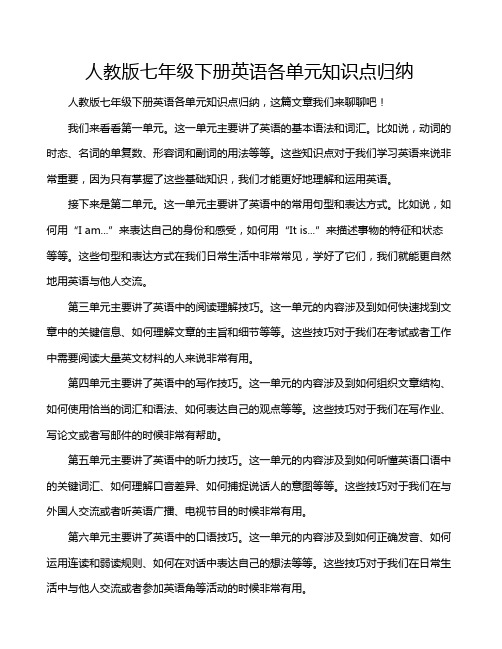
人教版七年级下册英语各单元知识点归纳人教版七年级下册英语各单元知识点归纳,这篇文章我们来聊聊吧!我们来看看第一单元。
这一单元主要讲了英语的基本语法和词汇。
比如说,动词的时态、名词的单复数、形容词和副词的用法等等。
这些知识点对于我们学习英语来说非常重要,因为只有掌握了这些基础知识,我们才能更好地理解和运用英语。
接下来是第二单元。
这一单元主要讲了英语中的常用句型和表达方式。
比如说,如何用“I am...”来表达自己的身份和感受,如何用“It is...”来描述事物的特征和状态等等。
这些句型和表达方式在我们日常生活中非常常见,学好了它们,我们就能更自然地用英语与他人交流。
第三单元主要讲了英语中的阅读理解技巧。
这一单元的内容涉及到如何快速找到文章中的关键信息、如何理解文章的主旨和细节等等。
这些技巧对于我们在考试或者工作中需要阅读大量英文材料的人来说非常有用。
第四单元主要讲了英语中的写作技巧。
这一单元的内容涉及到如何组织文章结构、如何使用恰当的词汇和语法、如何表达自己的观点等等。
这些技巧对于我们在写作业、写论文或者写邮件的时候非常有帮助。
第五单元主要讲了英语中的听力技巧。
这一单元的内容涉及到如何听懂英语口语中的关键词汇、如何理解口音差异、如何捕捉说话人的意图等等。
这些技巧对于我们在与外国人交流或者听英语广播、电视节目的时候非常有用。
第六单元主要讲了英语中的口语技巧。
这一单元的内容涉及到如何正确发音、如何运用连读和弱读规则、如何在对话中表达自己的想法等等。
这些技巧对于我们在日常生活中与他人交流或者参加英语角等活动的时候非常有用。
第七单元主要讲了英语中的文化知识。
这一单元的内容涉及到英美文化的差异、英国历史和地理等方面的知识。
了解这些知识可以帮助我们更好地理解和运用英语,同时也可以增进我们对不同文化的理解和尊重。
人教版七年级下册英语各单元知识点归纳是非常重要的一本书,它涵盖了许多我们在学习英语过程中需要掌握的基础知识和技能。
人教版七年级下册英语各单元知识点归纳
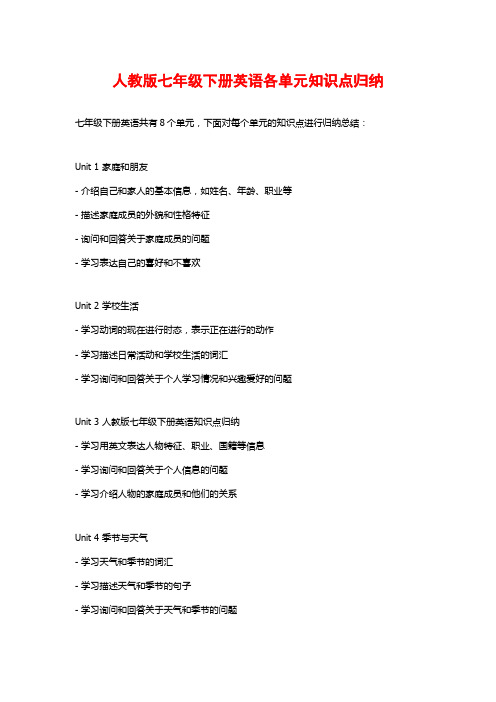
人教版七年级下册英语各单元知识点归纳七年级下册英语共有8个单元,下面对每个单元的知识点进行归纳总结:
Unit 1 家庭和朋友
- 介绍自己和家人的基本信息,如姓名、年龄、职业等
- 描述家庭成员的外貌和性格特征
- 询问和回答关于家庭成员的问题
- 学习表达自己的喜好和不喜欢
Unit 2 学校生活
- 学习动词的现在进行时态,表示正在进行的动作
- 学习描述日常活动和学校生活的词汇
- 学习询问和回答关于个人学习情况和兴趣爱好的问题
Unit 3 人教版七年级下册英语知识点归纳
- 学习用英文表达人物特征、职业、国籍等信息
- 学习询问和回答关于个人信息的问题
- 学习介绍人物的家庭成员和他们的关系
Unit 4 季节与天气
- 学习天气和季节的词汇
- 学习描述天气和季节的句子
- 学习询问和回答关于天气和季节的问题
Unit 5 人教版七年级下册英语知识点归纳
- 学习身体部位的名称
- 学习描述身体健康问题和症状的词汇
- 学习询问和回答关于身体健康的问题
Unit 6 对话与购物
- 学习日常生活中常用的购物用语和表达方式- 学习询问和回答价格、数量等问题
- 学习描述购物和交流的场景
Unit 7 句型归纳
- 复习和巩固前面单元所学的句式和语法知识- 学习运用所学知识进行情景对话和交流
Unit 8 时间和计划安排
- 学习描述日常生活中的时间安排和活动计划- 学习询问和回答关于时间和计划的问题
- 学习表示频率和时间段的词汇和短语。
人教版七年级下U1-U6知识总结

U1 Where is your pen pal from?1.Where is your pen pal from?你的笔友是哪里人?(1)be from 来自…… (动词be应根据主语而变化)e.g.I'm from Hubei.我来自湖北。
e.g.He is from America.他来自美国。
e.g.We are Chinese. We are from China.我们是中国人。
我们来自中国。
e.g.They are not from Japan.他们不是来自日本。
e.g.Where is your new teacher from?He is from New York.你们的新老师是哪里人?他是纽约人。
(2)where引导的特殊疑问句:where 意为“哪里”,位于句首。
where引导的特殊疑问句应根据实际情况作出回答。
e.g.Where are you from?你是哪里人?I'm from South Korea.我来自南朝鲜。
2.Where does he live?He lives in Mexico City.他住在哪里?他住在墨西哥城。
这也是where引导的特殊疑问句。
询问“某人住在什么地方?”用Where+助动词do/does+主语+live?e.g.Where do you live?你住在哪里?e.g.Where does your pen pal live?你的笔友住在哪里?He lives in Wuhan.他住在武汉。
*注意:当主语是第三人称单数时,疑问句的助动词要用does,其后的动词用原形。
在回答中动词要加s或es。
e.g.Where does your brother live?He lives in Beijing.你哥哥住在哪里?他住在北京。
3.What language does she speak?She speaks English.她讲什么语言?英语。
人教版七年级下册英语各单元知识点归纳

人教版七年级下册英语各单元知识点归纳学习英语,除了必要的语法、单词等基础知识外,还需要针对不同的场景去学习相关的知识。
人教版七年级下册涵盖了日常生活中的各种场景,如家庭、学校、饮食、购物、旅游等,下面将对各单元的知识点进行归纳。
第一单元家庭家庭是孩子们最熟悉的社交场所,也是孩子们进入社会的第一步。
学习家庭知识可以帮助孩子更好地理解家庭成员之间的关系,在家庭中扮演不同的角色。
重点知识:1.姓氏的用法:中国人的姓氏通常放在名字的前面,如“张三”。
2.家庭成员的称呼:爸爸(dad)、妈妈(mom)、儿子(son)、女儿(daughter)、爷爷(grandfather)、奶奶(grandmother)、外公(grandpa)、外婆(grandma)等。
3.家庭成员的职业:father/mother是名词,而teacher/doctor/nurse等职业是形容词,需加上a/an。
练习建议:家庭成员主要是平时我们常接触到的人,可通过和家人交流、自我介绍等来巩固这些知识。
比如,可以和家人用英语简单介绍自己,或者组织家庭活动,练习使用家庭成员的称呼等。
第二单元学校生活学校是孩子们重要的社交场所,学校生活中的语言、文化都对孩子的成长有着深刻的影响。
学生们在学校里不仅要掌握学科知识,还要学习如何与师生交流、如何在校园中与人相处。
重点知识:1.学科课程:英语(English)、数学(math)、音乐(music)、体育(PE)、科学(science)等。
2.学校场所:操场(playground)、教室(classroom)、办公室(office)、厕所(toilet)等。
3.常用语句:May I come in?、Goodmorning/afternoon/evening/night、What's up?、How are you?等。
练习建议:除了课堂上的学习,可以让孩子们参加学校的一些活动,如课间操、学校运动会等。
最全2018年人教版七年级下册英语各单元知识点大归纳

最全2018年人教版七年级下册英语各单元知识点大归纳-CAL-FENGHAI.-(YICAI)-Company One12017年人教版七年级下册英语各单元知识点大归纳Unit 1 Can you play the guitar◆短语归纳1. play chess 下国际象棋2. play the guitar 弹吉他3. speak English 说英语4. English club 英语俱乐部5. talk to 跟…说6. play the violin 拉小提琴7. play the piano 弹钢琴8. play the drums 敲鼓9. make friends 结交朋友10. do kung fu 练 (中国) 功夫11. tell stories 讲故事12. play games 做游戏13. on the weekend/on weekends 在周末◆用法集萃1. play +棋类/球类下……棋,打……球2. play the +西洋乐器弹/拉……乐器3. be good at doing sth.= do well in doing sth. 擅长做某事4. be good with sb. 和某人相处地好5. need sb. to do sth. 需要某人做某事6. can + 动词原形能/会做某事7. a little + 不可数名词一点儿……8. join the …club 加入…俱乐部9. like to do sth. =love to do sth. 喜欢/喜爱做某事 like ding sth.喜欢做某事1.show sth to sb = show sb sth “把某物给某人看”◆典句必背1. Can you drawYes, I can. / No, I can’t.2. What club do you want to joinI want to join the chess club.3. You can join the English club.4. Sounds good./That sounds good.5. I can speak English and I can also play soccer.6. Please call Mrs. Miller at 555-3721.◆语法一、情态动词can的用法:情态动词无人称和数目的变化,后面必须接动词原形,情态动词和动词原形一起构成谓语。
七年级英语人教版下册Unit1-Unit6知识梳理
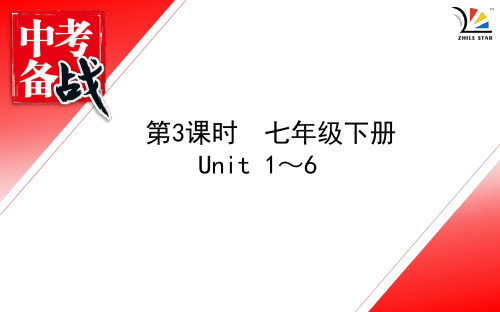
第3课时七年级下册Unit 1~6重点单词1. 唱歌v. ____→ ______n.歌手,歌唱家→ ____(过去式) 2.游泳v. _____→ ________n.游泳者→ _____(过去式) 3.说某种语言;说话v. _____→ _______n.演讲者→_____(过去式)→ _______(过去分词)4.小提琴n. _____→ _______n.小提琴演奏者sing singer sangswim swimmer swamspeak speakerspoke spokenviolin violinist5.牙齿n. _____→ _____(复数)6.一半n. ____→ ______(复数)7.生命;生活n. ___→ ____(复数)8.远的adj. ___→ _______/ _______(比较级)→ _______/ _______(最高级)9.横过;越过v. _____→ ______prep.横过________n.十字路口tooth teethhalf halveslife livesfar farther further farthest furthestcross acrosscrossing10.真的;符合事实的adj. ____→ _____adv.真正;确实→ _____n.事实;真相11.穿;戴v. _____→ _____(过去式)→ ______(同义词组) 12. 重要的adj. _________→ __________n.重要→___________adv. 重要的是→___________(反义词)不重要的13.带来v. _____→ _______(过去式)→____(反义词)带走;拿走true trulytruthwear wore put onimportant importanceimportantlyunimportantbring broughttake14.记得v. _________→ ______(反义词)忘记15.遵循;跟随v. ______→ ________adj. 下面的16.运气n. ____→ _____adj. 好运的→ _______(反义词)不幸的______adv. 幸运地→ _________(反义词)不幸地17.睡觉v. _____→ ______adj. 睡着的______adj. 瞌睡的remember forgetfollow followingluck lucky unluckyluckily unluckilysleep asleep sleepy18.危险n. _______→ _________adj. 危险的→ ____(反义词)安全的19.儿童n. _____→ ________(复数) 20.希望v. /n. ____→ ______(复数)danger dangeroussafechild childrenwish wishes重点短语1. 下国际象棋_________2.说英语____________3.擅长……____________ 4.练功夫__________5.让某人看某物_____________. 6.跟……说_________play chessspeak Englishbe good at. . .do kung fushow sb. sthtalk to. . .7.弹钢琴_____________8.善于应付……;对……有办法___________ 9.和……交朋友________________10.在某方面帮助某人___________11.在周末_________________________ 12.淋浴____________13.……要么……要么_____________play the pianobe good withmake friends withhelp sb. withon/at weekends/the weekendtake a showereither. . . or. . .14.大量,许多___________15.乘地铁______________16.骑自行车__________ 17.在……和……之间__________________ 18.实现;成为现实_________19.起床;站起______20. 听……__________quite a lot oftake the subwayride a bikebetween. . . . and. . . .come trueget uplisten to. . .21.在工作日/上课日___________ 22.清洗餐具____________23.铺床____________24.对某人严格要求______________. 25.遵守规则______________ 26.稍微;有点儿_______27.来自__________on weekdaysdo the dishesmake the bedbe strict with sbfollow the ruleskind ofcome from28.好运的象征___________________ 29.处于极大的危险中________________ 30.砍倒;砍伐________31.由……制成__________32.做作业__________________33.散步;走一走__________a symbol of good luckbe in great dangercut downbe made ofdo (one's) homeworktake a walk34.认为;想起_______ 35.准时___________ 36.外出(娱乐) ______ 37.迷路_______think of(be) on timego outget lost重点句型1. 我想加入故事俱乐部。
七年级英语下册Unit1-Unit6知识梳理-最新人教版

14.记得v. _re_m__e_m__b_e_r→ _f_o_rg_e_t_(反义词)遗忘 15.遵循;跟随v. _f_o_ll_o_w_→ _fo_l_lo_w__in_g_adj. 下面的 16.运气n. _lu_c_k_→ _lu_c_k_y_adj. 好运的→ u_n__lu_c_k_y_(反义词) 不幸的 _lu_c_k_i_ly_adv. 幸运地→ _u_n_l_u_c_k_il_y_(反义词)不幸地 17.睡觉v. _s_le_e_p_→ _a_s_le_e_p_adj. 睡着的 _sl__g_e_r_→ _d_a_n_g_e_r_o_u_sadj. 危急的→ _s_a_fe_(反义词)安全的 19.儿童n. _c_h_il_d_→ _c_h_i_ld_r_e_n_(复数) 20.希望v. /n. _w_i_sh_→ _w_i_sh__es_(复数)
重点短语 1. 下国际象棋 _p_la_y__c_h_e_s_s 2.说英语 _sp__ea_k__E_n_g_l_i_sh_ 3.擅长…… _b_e_g_o_o_d__a_t_. _. _. 4.练功夫 _d_o__k_u_n_g_f_u_ 5.让某人看某物_s_h_o_w__s_b_. _s_th___. 6.跟……说 _t_a_lk__to_._._._
1.say意为“说”,强调 __说__的__内__容_。 2.tell意为“告知,告知;表达,说”,其后常接双宾语 或 _动__词__不__定__式__作宾语补足语。
常考短语: (1) _te_l_l_s_b_. _s_th_. “告知某人某事” (2) _t_e_ll_s_b_._a_b_o_u_t_s_t_h_. “告知某人关于某事” (3) _te_l_l_s_b_._t_o_d_o__st_h_. “告知某人去做某事” (4) _te_l_l_s_to_r_i_e_s“讲故事” (5) _to__te_l_l_t_h_e_t_r_u_th_“说实话”
七年级英语下册(1-6)复习提纲-经典教学教辅文档
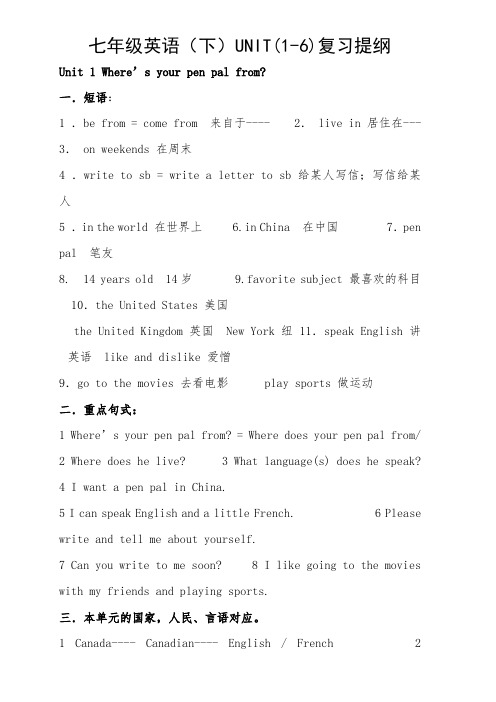
七年级英语(下)UNIT(1-6)复习提纲Unit 1 Where’s your pen pal from?一.短语:1 .be from = come from 来自于---- 2. live in 居住在--- 3. on weekends 在周末4 .write to sb = write a letter to sb 给某人写信;写信给某人5 .in the world 在世界上 6.in China 在中国 7.pen pal 笔友8. 14 years old 14岁 9.favorite subject 最喜欢的科目10.the United States 美国the United Kingdom 英国New York 纽11.speak English 讲英语like and dislike 爱憎9.go to the movies 去看电影play sports 做运动二.重点句式:1 Where’s your pen pal from? = Where does your pen pal from/2 Where does he live?3 What language(s) does he speak?4 I want a pen pal in China.5 I can speak English and a little French.6 Please write and tell me about yourself.7 Can you write to me soon? 8 I like going to the movies with my friends and playing sports.三.本单元的国家,人民、言语对应。
1 Canada---- Canadian---- English / French 2France------ French------French3 Japan------Japanese----Japanese4 Australia----Australian----- English5 the United States------ American---- English6 the United Kingdom---British----- EnghishUnit 2 Where’s the post office?一.A sking ways: (问路)1.Where is (the nearest) ……?(比来的)……在哪里?2.Can you tell me the way to ……?你能告诉我去……的路吗?3.How can I get to ……?我怎样到达……呢?4.Is there …… near here / in the neighborhood? 附近有……吗?5.Which is the way to ……?哪条是去……的路?二.Showing the ways: (指路)1. Go straight down / along this street. 沿着这条街不断走。
- 1、下载文档前请自行甄别文档内容的完整性,平台不提供额外的编辑、内容补充、找答案等附加服务。
- 2、"仅部分预览"的文档,不可在线预览部分如存在完整性等问题,可反馈申请退款(可完整预览的文档不适用该条件!)。
- 3、如文档侵犯您的权益,请联系客服反馈,我们会尽快为您处理(人工客服工作时间:9:00-18:30)。
(人教版新目标英语)七年级下册英语1-6单元复习Unit 1 Can you play the guitar ?1、can+动词原形,它不随主语和数而变化。
(1)含有can的肯定句:主语+can+谓语动词的原形+其他。
(2)变一般疑问句时,把can提前:Can+主语+动词原形+其他?肯定回答:Yes,主语+can。
否定回答:No,主语+can't.(3)含有can的否定句:主语+can't+动词的原形+其他。
(4)含有can的特殊疑问句:特殊疑问词+can+主语+动词原形+其他?2、may+动词的原形。
(may为情态动词)一般疑问句是把may提前,肯定回答是:Yes,主语+may。
否定回答是:No,主语+mustn't。
或please don't。
join+某个组织,俱乐部,party,参军,党派等“加入”Join sb. “参加到某人中”join in (doing)sth “加入做......,参加某个活动”Join in=take part in +活动,比赛3、说某种语言:speak+语言4、play+球、棋、牌;play+the+乐器。
5、擅长于(做)什么:be good at +名词/动ing6、帮助某人做某事:help sb. (to ) do sth. help sb. with sth.7、我能知道你名字吗?May I know your name?8、想要做什么:want to do sth 例如:I want to learn about art.9、What club do you want to join?I want to join the chess club and the basketball club.10、What club does Tom want to join? He wants to join the swimming club .11、He can’t play the violin or the piano. Can you help kids with swimming? 12、Why do you want to join the English club? Because I want to learn English well.Unit 2 What time do you go to school ?1、what time和when引导的特殊疑问句。
(1)对时间提问用what time,也可以用when。
询问钟点时用what time,询问日期、月份、年份时用when。
(2)询问做某事的时间时,两者可以互换。
(3)其他询问时间的句子:What's the time? =What time is it?现在几点了?时刻表达法:顺读法和逆读法。
(1)顺读法:“钟点+分钟”直接读数字。
(2)逆读法:借助介词past或to表示,要先说分再说钟点。
A.当分钟不超过30分钟时(包括30分钟),即<或=30,用past表示。
其结构为:“分钟+past+整点”意为“几点过几分”。
B.当超过30分钟时,即>30,用to表示。
其结构为:“所差分钟(即60—所过分钟数)+to+下一个整点”,to译成“差”,差几分钟到几点。
C.当分钟为30分钟用half表示,当分钟为15分钟用a quarter。
2、always 总是>usually 通常>often常常>sometime 有时3、Watch+TV、球赛“观看,观赏”,特指长时间注视。
See+电影、医生“看见”,强调看的结果。
Look “看”,强调看的动作,look后接宾语时要用介词at。
Read+书刊、杂志“阅读”4、listen to +宾语6、Take a shower “淋浴”7、Eat breakfast 吃早餐5、Go to +地点名词如:go to school go+地点副词如:go homeUnit 3 How do you get to school?一、本单元知识点总结1.get to school 到校2.take the subway 乘地铁3.take the train 坐火车4.leave for 到……地方去,离开去某地5.take…to…把……带到……6. most students 大多数学生7. from…to…从……到……8.think of 想到,想起9.ride bikes 骑自行车10.in other parts of the world 在世界的其他地方11. how far 多远(路程、距离) 12.how long多长(时间)13.take the train to school 乘火车去上学14.in places 在一些地方15.go to school by boat乘船去上学16.on the school bus乘坐校车17.be different from和……不同18.one 11-year old boy 一个十一岁大的男孩二、重点知识详解1.take +a/an/the+表示交通工具的名词,乘……去某地,是动词短语,在句中作谓语。
He takes the train. take the subway乘地铁take a walk散步take a shower洗个澡take a rest休息一会take a seat 坐下take some medicine 吃药2.by+表示交通工具的单数名词或on/in+ a/an/the/one’s+表示交通工具的单数名词,是介词短语作方式状语。
I get to school by bike. = I get to school on my bike.3.walk/ride/drive/fly+to+地点名词,步行/骑自行车/开车/坐飞机去某地表示乘交通工具方式可以互换表达相同的意义:Take the bus to school=go to school by bus=go to school on a bus Drive a car to work=go to work by car=go to work in a carFly to shanghai=go to shanghai by plane/air=take the/a plane to shanghai=go to shanghai on a/an/the plane.4.get表示“到达”,后接名词需加to,接地点副词不加to.reach 给示到达,是及物动词,其后直接接宾语。
arrive in+大地点arrive at +小地点后接副词不需介词。
5. It takes sb some money/time to do sth.花费某人多少时间/钱做某事Sb pay some money for sth 某人为某物花费多少钱Sb spend some time/money on sth 某人在做某事或某物上花费时间/钱Sb spend some time/ money (in)doing sth Sth cost sb some money 某物花费某人多少钱6. How far is it from A to B?=How far is B from A?答语有两种:(1)It’s…meters/miles/kilometers(away)有……米/英里/千米(远)(2)It ‘s about ten minutes’walk/ ride. 大约有十分钟步行/骑车的路程。
7have to 后加动词原形,侧重客观的需要,有“不得不,被迫”之意,有多种时态形式,否定式为don’t have to(needn’t)意为“不必”。
Must 侧重于说话者的主观看法,认为有必要或有义务做某事,只有现在时一种形式,否定式must’t意为“一定不要,不允许,禁止”反意词为“needn’t”。
8.感谢用语:Thank you very much , Thanks a lot , Many thanks.回答感谢用语的句子:That’s ok /all right. 不用谢。
You are welcome 不客气。
It is my pleasure./My pleasure./It is a pleasure.不客气、那是我的荣幸。
/Don’t mention it。
别在意。
It was nothing at all.那没什么。
三、语法归纳(一)how 引导的特殊疑问句1.how 引导的特殊疑问句提问交通方式,其答语分三种情况:a. take a/an/the+交通工具(单数)b. by+交通工具(单数)c. on/in+限定词+交通工具2. how far 用来提问距离,多远,其答语分为两种:(1)用长度单位表示:It is five kilometers.(2)用时间表示:It’s twenty minutes’walk.3.how long 用来提问时间,意为多久回答常用“for+段时”。
----How long have you learnt English?----For 3 years.how soon 用来提问做完某事还需要多长时间,常用于将来时态时,常用“in+时间段”来回答。
――How soon will you arrive in Beijing?----In 3 hours.Unit 4 Don’t eat in class肯定的祈使句:(1) 实义动词原形+其他;(2) be动词原形+形容词+其他;(3) Let sb do sth.否定的祈使句:(1) Don’t+实义动词+原形;(2) Don’t be+形容词+其他;(3) Don’t let sb do sth (4) No+Ving.练:(1) My mother said to me, “Tom, _______ in bed.”A. not readB. doesn’t readC. don’t readD. didn’t read(2) Don’t __________ (fight). = No __________ (fight).2. 不要迟到:Don’t arrive late. = Don’t be late. (arrive = be)上课/上学不要迟到:Don’t arrive (be) late for class/school.3. 主语省略(无主语):Don’t arrive late for class.主语不省略(有主语):We can’t arrive ;ate for class.4. 在学校我们必须穿校服:We have to wear uniforms at school.句型:不得不/必须做某事:have to do sth否定:不必做某事:don’t have to do sth穿校服:单数:wear a uniform 复数:wear uniforms练:(1) –I can’t stop smoking, doctor. –For your health, I’m afraid you ______.A. canB. mayC. mustD. have to5. 在我家里有太多的规矩:I have too many rules in my house.词组:太多…:too many…6. 我从来没有任何快乐:I never have any fun.(never译为“从来没有”,表示否定,否定句中表示“任何,一些”,用any) 7. 不要大声说话:Don’t talk loudly.请大声说:Speak loudly, please.8. 他擅长于唱歌:He is good at singing.句型:擅长于做某事:be good at doing sth9. 表示“地点”的词组:(1) 在教室里:in the classroom 在课堂上:in class(2) 在走廊上:in the hallways 在学校里:at school = in school10. 表示“时间”的词组:(1) 下课后:after class 放学后:after school(2) 在上学的白天/晚上:on school days/nights 比较:at night(3) 到晚上10点钟之前:by 10 o’clock p.m.11. (1) with 和;如:He lives in Beijing with my parents. (不能用and)(2) with 戴着;如:Do you know the fat man with a hat? (不能用wears)(3) with 有着;如:It’s an old house with a beautiful garden. (不能用has)Unit5 Why do you like pandas?1. –让我们先去看考拉。
